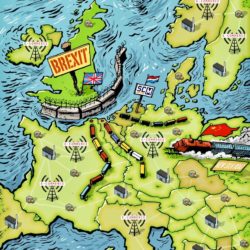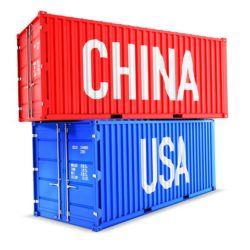Growing need for own network models

We still believe in free trade in Europe, but government leaders elsewhere in the world are increasingly using trade as a political instrument. This is increasing the uncertainty in supply chains, which is creating a growing need for companies themselves to develop supply chain network design expertise. At Novo Nordisk and Heineken, they already have that expertise.
By Marcel te Lindert and Martijn Lofvers
The trade war between the USA and China appears at first glance to be the consequence of a rash autonomous decision by Donald Trump, but there is more to it than that. It seems that the US is increasingly exerting its geopolitical power through its trade interests rather than its military resources. “Many of Trump’s measures have divided opinions within the American government, but everyone seems to agree that China has an unfair competitive advantage. There are several signs that the American government wants to see this trade war through to the end”, says Frans-Paul van der Putten from Clingendael, the Netherlands Institute of International Relations.
The media is full of reports about situations in which trade relationships are being leveraged for political gain. Take Brexit, for example. The British government’s indecisiveness has created more than two years of uncertainty for companies. Will they still be able to unrestrictedly ship goods to or from the UK in a few months’ time? Toyota is already anticipating a potential closure of its factory near Birmingham in the case of a hard Brexit, simply because it will jeopardize the just-in-time delivery of parts from mainland Europe.
Another example is the 2015 nuclear deal with Iran, which Trump has pulled out of against the EU’s wishes. Which European company is bold enough to continue trading with Iran and put itself at risk of American sanctions? This intertwining of economics and geopolitics is affecting global supply chains, according to Van der Putten: “Supply chains are in a constant state of flux, of course, but things are a lot harder to predict now that politics is becoming an important factor.”
New Silk Road
China is a prime example of a country that mixes geopolitical interests with economic ones. After all, economic growth is crucial to China’s Communist Party. The country’s rising wealth is good for stability and is helping to keep the current leaders in power. “Besides that, China has a long-held sense of vulnerability, which is why the nation wants to minimize its dependence on other countries”, adds Van der Putten, who is particularly focused on the New Silk Road.
China’s investments in the rail link with Europe follow several decades of rapid industrial growth, which has been accompanied by major investments in urbanization and infrastructure. “China is now attempting to tighten its grip on the routes for the supply of raw materials and the distribution of finished products to sales markets such as Europe. The American navy is huge and dominates the world’s seas. China is aware of that and is investing heavily in its own navy, but it will take some time before it has caught up. The New Silk Road is one of the solutions to reduce the country’s reliance on ocean routes.”
In addition to the rail link, China is also striving to reinforce its position in the shipping industry. In recent years Cosco – the biggest state-owned container shipping company in China – has acquired competitors such as China Shipping and Orient from Hong Kong, making Cosco the world’s third-largest company of its kind. “China has further strengthened its position in the chain by investing in European container terminals, so the country is well on the way to having the world’s biggest merchant shipping fleet. It has already overtaken Japan.” … … …
Want to read more?
Subscribe on iPad or Android tablet to read the full version >>
or
Subscribe on print to receive the next issue >>
This article was first published in Supply Chain Movement 31 | Q4 – 2018










